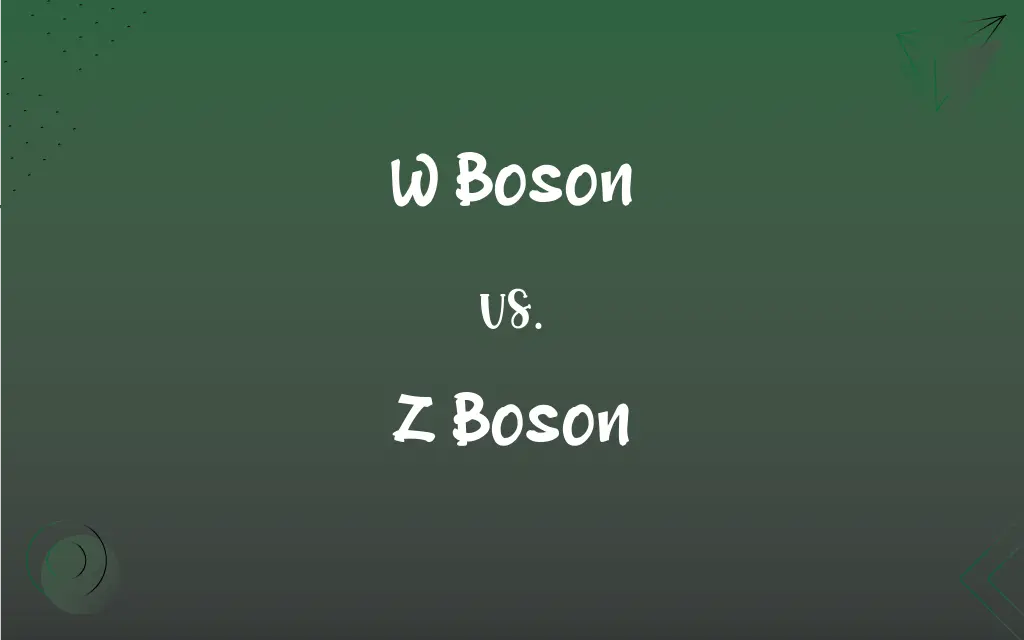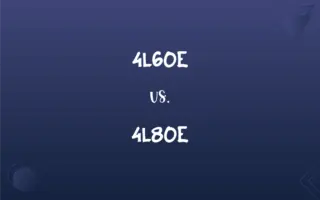W Boson vs. Z Boson: What's the Difference?
Edited by Aimie Carlson || By Janet White || Published on February 23, 2024
W bosons are charged particles mediating weak force and change particle types; Z bosons are neutral, mediating weak force without changing types.

Key Differences
W bosons are elementary particles that carry a positive or negative electric charge and are responsible for mediating the weak nuclear force. Z bosons, in contrast, are electrically neutral and also mediate the weak force but without altering the type of particles involved.
W bosons play a critical role in particle interactions that involve a change in the type (flavor) of particles, such as in beta decay. Z bosons, while also mediators of the weak force, do not induce such changes, maintaining particle types in interactions.
In the Standard Model of particle physics, W bosons are distinguished by their ability to decay into a lepton and a neutrino. Z bosons, on the other hand, can decay into any light neutrino pair, reflecting their neutrality.
The discovery of W bosons in 1983 was a monumental step in confirming the electroweak theory. Similarly, the discovery of the Z boson, made concurrently, validated the unification of electromagnetic and weak forces.
W bosons have a mass of about 80.4 GeV/c², making them heavier than most particles. Z bosons are even heavier, with a mass of about 91.2 GeV/c², underscoring their significance in the weak force.
ADVERTISEMENT
Comparison Chart
Electric Charge
Charged (either positive or negative)
Neutral
Role in Weak Force
Mediates with particle type change
Mediates without particle type change
Typical Decays
Into a lepton and a neutrino
Into any light neutrino pair
Discovery Year
1983
1983
Mass
Approximately 80.4 GeV/c²
Approximately 91.2 GeV/c²
ADVERTISEMENT
W Boson and Z Boson Definitions
W Boson
A charged particle in the weak nuclear force.
The W boson mediates beta decay.
Z Boson
Does not change particle types in weak interactions.
Z bosons maintain particle identity during decay.
W Boson
A carrier of the weak force, altering particle types.
W bosons can change a neutron to a proton.
Z Boson
Can decay into any neutrino pair, showcasing neutrality.
Z boson decays are versatile due to its neutrality.
W Boson
Discovered in 1983, confirming the electroweak theory.
The discovery of the W boson was a milestone in physics.
Z Boson
Its discovery in 1983 helped validate electroweak unification.
Finding the Z boson was crucial for the Standard Model.
W Boson
Exists in positively and negatively charged forms.
Both W+ and W- bosons are essential in weak interactions.
Z Boson
A neutral particle in the weak nuclear force.
The Z boson mediates neutrino interactions.
W Boson
An elementary particle with a mass around 80.4 GeV/c².
The W boson's mass is significant in particle physics.
Z Boson
An elementary particle with a mass of about 91.2 GeV/c².
The Z boson's mass is greater than that of the W boson.
FAQs
How do W bosons affect particles?
They change the type (flavor) of particles in weak interactions.
Are Z bosons charged?
No, Z bosons are electrically neutral.
When were W bosons discovered?
In 1983.
What is a W boson?
A charged elementary particle involved in the weak nuclear force.
What decay patterns do Z bosons have?
They can decay into any light neutrino pair.
What distinguishes a Z boson?
It's a neutral particle mediating the weak force without changing particle types.
What was the significance of discovering the Z boson?
It validated the theory of electroweak unification.
Are there different types of W bosons?
Yes, there are positively (W+) and negatively (W-) charged types.
Do Z bosons contribute to the electroweak theory?
Yes, along with W bosons, Z bosons are crucial for the electroweak theory.
What is the mass of a W boson?
About 80.4 GeV/c².
Can W bosons decay into neutrinos?
Yes, typically into a lepton and a neutrino.
How does the W boson differ from the photon?
W bosons are charged and massive, mediating weak force, while photons are massless and mediate electromagnetic force.
What is the significance of the W boson's charge?
The charge allows W bosons to interact with particles differently based on their charge.
What interactions involve Z bosons?
Z bosons are involved in weak force interactions without particle type change.
Can Z bosons change the type of a particle?
No, Z bosons mediate weak interactions without altering particle types.
Why is the Z boson's neutrality important?
Its neutrality allows it to interact without bias towards charged particles.
How heavy is a Z boson?
Approximately 91.2 GeV/c².
Are W and Z bosons fundamental particles?
Yes, both are fundamental particles in the Standard Model of particle physics.
What role do W and Z bosons play in the universe?
They are essential for understanding weak nuclear interactions, key to many processes in particle physics and cosmology.
Do W bosons have a role in beta decay?
Yes, they mediate beta decay processes.
About Author
Written by
Janet WhiteJanet White has been an esteemed writer and blogger for Difference Wiki. Holding a Master's degree in Science and Medical Journalism from the prestigious Boston University, she has consistently demonstrated her expertise and passion for her field. When she's not immersed in her work, Janet relishes her time exercising, delving into a good book, and cherishing moments with friends and family.
Edited by
Aimie CarlsonAimie Carlson, holding a master's degree in English literature, is a fervent English language enthusiast. She lends her writing talents to Difference Wiki, a prominent website that specializes in comparisons, offering readers insightful analyses that both captivate and inform.






































































